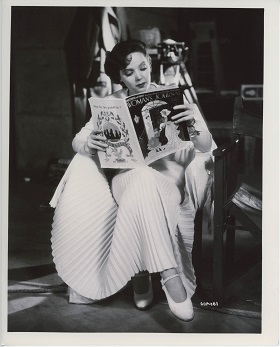Eileen Barnett (EB-95-195) and Joe Barnett (JB-95-195)

Jessie Matthews (courtesy of BFI Film Stills, Posters and Designs)
In June 1995, in the quest for participants in Cinema Culture in 1930s Britain Valentina Bold made contact with the Harrow Friendship Club, based at the Middlesex New Synagogue in the north London suburb of Harrow; and Mrs Eileen Barnett undertook to see if any fellow members were interested in taking part. Several of Harrow's eighteen core informants became involved in the project in this way, including Mrs Barnett herself and her husband, Joe. Eileen Barnett was born in Stamford Hill in 1924, one of two children of parents who ran a family business in retail textile. On leaving school at the age of fifteen she took a job as a shop assistant; subsequently her main paid occupation was as a bookkeeper. Joe Barnett was born in Hackney in 1923, an only child. His father worked in the cinema industry and his mother was a housewife. Mr Barnett's first job on leaving school at fourteen was as a salesman, and his main lifetime occupation had been as an administrator in the fashion industry. Mr and Mrs Barnett were interviewed together at their home in Sudbury Hill, Harrow on 18 July, 1995.
The interview opens with Mrs Barnett producing a card, received from her brother on her sixteenth birthday, featuring a photo of her favourite star, Tyrone Power, with Norma Shearer, his co-star in the film Marie Antoinette: this she donates this to the project. She recalls that she used to go to the cinema two or three times a week, and regards the full programme of shorts, newsreels, and so on alongside the main feature as exceptionally good value. She remembers the ubiquitous queues outside cinemas, and asking grownups to accompany her into 'A' films. The couple name several cinemas in and around Stamford Hill and Stoke Newington, where they grew up, and--a theme which comes up several times throughout the interview--insist that they have no desire whatsoever to go to the cinema today. Looking back on her youthful cinemagoing, Mrs Barnett remembers the expansive pleasures of the continuous programme, her excursions to the pictures with friends, and her mother's lifelong love of films. Photos produced by the interviewer elicit many memories of stars and films, including their ‘likes’ (Astaire and Rogers, Jessie Matthews, Deanna Durbin) and dislikes (Joan Crawford, Greta Garbo). They call to mind the particular pleasures of Cinerama and CinemaScope: "You had the feeling that you were in it." Mrs Barnett recalls the intense publicity surrounding child star Shirley Temple, and the Temple-style dresses that her mother bought for her. There are memories of reading the film magazines, of enjoying 'foreign' films in the West End, of cinemas that boasted tea rooms, and of leisure pursuits--playing outdoors, listening to radio, dancing--other than going to the pictures.Documents, Memorabilia and Related Links
Harrow home pageFinsbury Park Astoria (cinematreasures site)
Regent Street Cinema (cinematreasures site)
Jessie Matthews singing 'Over My Shoulder' from Evergreen, 1934 (Youtube)
Marie Antoinette Birthday Card